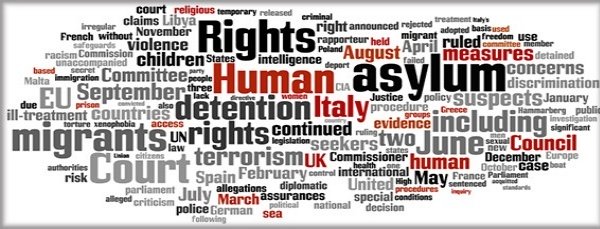[Brussels, 10 December 2014] 10 EU civil society organisations (The European Women’s Lobby, ENAR – European Network against Racism, AGE-Platform Europe, IGLYO, European Network on Religion and Belief, ILGA-Europe, Social Platform, European Disability Forum, Eurochild and European Youth Forum) call on EU decision-makers to show clear commitment on the
proposed Horizontal Directive on equal treatment.
EU equal treatment law: time for Member States to act!
Brussels, 5 December 2014 – As EU Member States’ representatives prepare for 11 December’s EPSCO Council, organisations representing millions of EU citizens at risk of discrimination, including women, persons with disabilities, younger and older people, LGBTI persons, members of ethnic, religion and belief communities as well as persons with a migration background, call on them to show clear commitment on the proposed Horizontal Directive on equal treatment.
Six years after the Commission’s proposal for new legislation on equal treatment, the Horizontal Directive is still stuck in negotiations at the Member State level, due to strong resistance from a few countries. This is
unacceptable, as fundamental rights are not up for negotiation or cherry picking. The Lisbon Treaty clearly provides the basis for this directive, indispensable to respect the fundamental rights as guaranteed by the
Charter. The equality and non-discrimination networks signing this letter, welcome the renewed commitment by the European Commission to unblock this proposal. We moreover welcome the achievements of the Italian
Presidency, which revived the negotiations on the Directive and put a new consolidated text on the table. Over the past few weeks, several Member States lifted their outstanding reservations. In the aftermath of the fifth
anniversary of the entry into force of the Charter of Fundamental rights, all Member States should show their commitment to the fight against discrimination. The time is now ripe for having a constructive discussion in the
EPSCO Council of 11 December on the remaining issues and for making a clear step towards the adoption of the directive as soon as possible.
The Directive is needed as discrimination is still affecting the everyday life and rights of EU citizens. For instance:
- In many EU countries, there are upper age limits in access to essential financial services such as travel insurance, bank loans and credit facilities, and in access to social protection such as disability allowances, often set at the official retirement age.
- Surveys by the EU Fundamental Rights Agency on Muslims’ and Jews’ experiences of discrimination show that high levels of discrimination occur in private services and schools, respectively.
- In schools and at work, LGBTI people experience severe bullying and harassment due to their sexual orientation. Same-sex couples are being denied visiting rights to their partners as some hospital policies only accept visits from legal partners.
- A survey from the European Youth Forum on youth and multiple discrimination shows that young people particularly experience discrimination in terms of education and employment/occupation (both in accessing a paid job and in the workplace) as well as when accessing goods and services, including housing.
- 78% of Europeans who participated in the disability survey on freedom of movement said that they would make more use of their right to free movement in the EU if there were no barriers, such as inaccessible goods and services, non-adapted public spaces and discriminatory attitudes.
We urge all EU governments to show unanimous leadership on equality and adopt a strong anti-discrimination Directive with a broad scope of application. By stalling its adoption, EU Member States are sending the message that they don’t care about respecting human rights and ensuring protection against discrimination for their citizens. At the same time they maintain existing barriers to accessing goods and services, they prevent EU inhabitants from contributing to Europe’s growth as citizens, consumers and volunteers and they create obstacles for businesses and service providers
Download the statement in PDF here.


